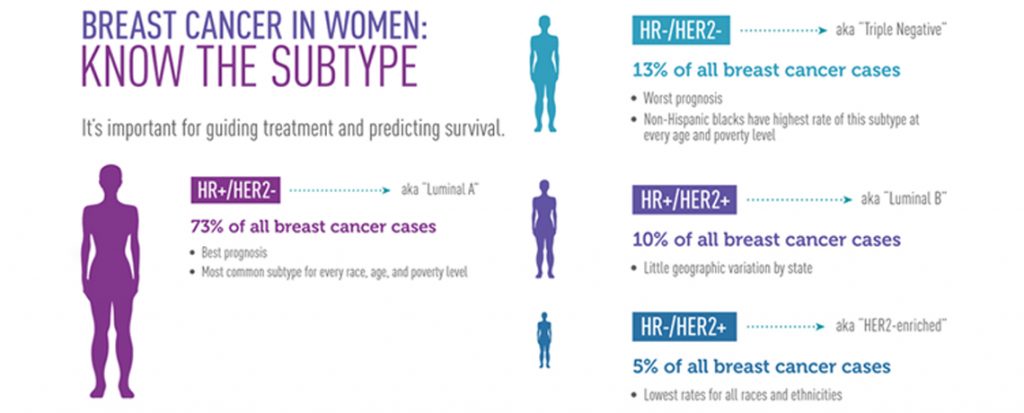Zulekha Hospital Sharjah
Sharjah,United Arab Emirates

If you have been diagnosed with breast cancer, it is almost decided that the surgeon will ask for a biopsy. During a biopsy, a sample of the cancer-affected tissue is taken for pathological analysis. A biopsy can be conducted before surgery or during surgery for breast cancer removal.
The pathological report tells you the hormone receptor status. That is, it tells you whether the cancer cells in your breast possess receptors that are sensitive to the two hormones, estrogen, and progesterone. The receptors are actually proteins present on the surface of the cells that identify the triggers and accordingly signal the cells to grow.
In the case of breast cancer, hormone receptors, if present, pick up hormone signals and tell the cells to grow. These receptors are present in normal breast cells and some types of breast cancer cells as well.

Breast cancer cells may have just ER-positive or PR-positive cells or both. Apart from hormone receptor status, there is something called HER-2 positive or negative breast cancer. HER2 is actually a protein made by cells in the breast. Nearly 20 percent of the breast cancer cells make this protein, and such a cancer is characterized as fast-growing or aggressive. Such cancers are almost always treated with the help of specific drugs along with chemotherapy after the surgery.
This article talks about some of the important things that you must know about the hormone receptor.
Immunohistochemistry (IHC) is the most common test used to check or confirm the presence of receptor cells in the breast cancer tissue retrieved during a biopsy. The most important reason why knowing hormone receptor status is that the cancer treatment plan prepared by the oncologists will depend on the kind of cells that you possess. It helps them make the best treatment decisions, based on the type, extent, spread, and hormone receptor status of your cancer.
A tumor is regarded as hormone-receptor-positive if at least one percent of the cells that are pathologically tested possess estrogen or progesterone receptors. If the concentration is less than one percent, the cells are treated as hormone-receptor-negative.
The hormone receptor status of the breast cancer cells clears the picture for the oncologists. For example, hormone-receptor-positive cancer grows slowly and women with this type of cancer have a better short-term outlook. On the other hand, hormone-receptor-negative cancers grow quickly and faster than hormone-positive cells and cancer relapse, if it happens, happens in the initial few years after the first treatment.
Additionally, ER/PR-positive tumors are more likely to respond to hormone therapy as compared to ER/PR-negative tumors. There are different types of medications and drugs available for hormone therapy. These drugs work by blocking the hormonal receptors or lowering the levels of estrogen in the body. These may include tamoxifen and class of drugs known as aromatase inhibitors and CDK 4/6 inhibitors.
HER2, a growth-promoting protein, is present on the surface of all breast cells. However, some breast cancer cells may possess a higher than normal concentration of this protein. Such cancer cells are known as HER2-positive. Such cancers are more likely to spread quickly and aggressively.
It is important to know the HER-2 status of cancer in women who have been diagnosed with invasive breast cancer. This is because such cancers are more likely to be benefited from the use of drugs that target the HER2 protein.
A Fluorescent in situ hybridization (FISH) or IHC, conducted at the time of biopsy testing, confirm whether the cancer is HER2-positive or not. In case the result is 0 or 1+, the cancer is regarded as HER2-negative. Such cancers do not respond to drugs that target the HER2 protein. If the result is 3+, the cancer is HER-2 positive and respond well to drugs that target this protein. The HER2 status is not clear and further testing is required if the result is +2.
Triple-negative breast cancers to do not too much of HER2 protein. Additionally, they do not possess ER and PR hormone receptors. This type of cancer is more common in African-American and Hispanic women, in addition to younger women.
Triple-negative breast cancers are more likely to spread quicker than any other type of breast cancer. In addition, treatment is a bit tricky. Because the protein and the hormone receptors are absent, specific drugs cannot be used to target HER2 protein or block ER/PR hormone receptors. Therefore, such patients are treated with the help of drugs most suitable for chemotherapy.
Triple-positive breast cancers have too much of HER2 and also possess ER/PR hormone receptors. The drugs that target HER2 can be used for the treatment of women who have triple-positive breast cancer. Additionally, drugs that block ER/PR hormone receptors can also be used for their treatment.

Looking for Breast Cancer Treatment Plan?
Get Help from ExpertsOther Links: Breast Cancer Treatment starting from USD4000
Breast Cancer Awareness Month: Types, treatments, and costs
Sharjah,United Arab Emirates
1 Reviews
In the year 1992 with the noble vision of Dr Zulekha Daud who shifted her base from India to Sharjah in order to serve people who are in need at an affordable cost, Zulekha Healthcare Group was established. She later established a hospital in Dubai too and Zulekha Dubai is now true to its mission of serving the suffering and the ailing. It is a multidisciplinary hospital with advanced diagnostic centres and well-equipped pharmacies. In the year 2004 the Dubai hospital saw its inception. It h... Read More
103
PROCEDURES
11
DOCTORS in 10 Specialties
6+
Facilities & Amenities
1+
Reviews
Bangalore,India
1 Reviews
Among hospitals in Bangalore one of the leading healthcare delivery providers is Fortis Bangalore. It has secured number 2 position in terms of being equipped with the latest technology and being one of the most advanced hospitals in the world. Their 24x7 emergency services and pharmacy services enfold their customers with a sense of security that the duty of health care is now in trusted hands. Not only some of the best doctors and surgeons man the hospital but there are numerous talented v... Read More
138
PROCEDURES
32
DOCTORS in 12 Specialties
20+
Facilities & Amenities
1+
Reviews
Bangalore,India
The future of cancer care has been revolutionized by HCG Bangalore. They have a team of best oncologist in Bangalore working with them thus bringing cancer care to a new step and dimensions. It started its operations as Bangalore Institute of Oncology which was started by a group of compassionate oncologists. They were the pioneers in terms of introducing many cutting edge technologies. Advanced diagnosis helps in proper selection of mode of treatments for various stages of cancer. The... Read More
27
PROCEDURES
7
DOCTORS in 3 Specialties
4+
Facilities & Amenities
Dubai,United Arab Emirates
2 Reviews
In the year 1992 with the noble vision of Dr. Zulekha Daud who shifted her base from India to Sharjah in order to serve people who are in need at an affordable cost, Zulekha Healthcare Group was established. She later established a hospital in Dubai too and Zulekha Dubai is now true to its mission of serving the suffering and the ailing. It is a multidisciplinary hospital with advanced diagnostic centers and well-equipped pharmacies. In the year 2004, the Dubai hospital saw its inception. It... Read More
100
PROCEDURES
13
DOCTORS in 10 Specialties
6+
Facilities & Amenities
2+
Reviews
Bangalore,India
First of its kind in South India, Apollo hospital in Bangalore is a delineated name among the Apollo chain of Hospitals. It is proud to have the state of the art armamentarium equipped with the right technologies under a single roof. After undergoing an extensive process of assessments the medical experts and doctors have been selected who have undergone trainings in international medical bodies around the world.
Apollo hospital Bangalore review shows that 99.6% is their success rate ... Read More
111
PROCEDURES
38
DOCTORS in 13 Specialties
6+
Facilities & Amenities

With over 14 years of experience. Dr. Vijita Jayan is an extremely competent, skilled & revered Senior Neuro Physiotherapist. She holds an impeccable academic record and extensive experience in the field of neuro-rehabilitation. She is renowned for handling mobility-dependent cases. She is also an avid writer of several published articles & research papers. Being awarded several accolades in her career, she is considered one of the leading names In the field of Physical Medicine and Rehabilitation.
(+1) 424 283 4838